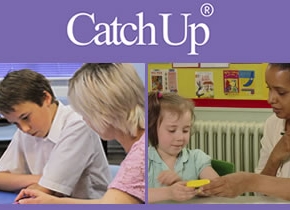
Request a full Catch Up® information brochure and details of our free information webinars
Find out more
Pupils with dyslexia present schools with a real challenge. This is not surprising as brain imaging techniques reveal that the brain of the dyslexic is 'wired differently'. So it is unlikely there is any teaching approach or product that could be a 'breakthrough' with dyslexia.
However, in the absence of a brain scanner in every Special Needs Department, it can be difficult to distinguish between a pupil who has considerable literacy difficulties and a pupil who has dyslexia. Added to that, it usually takes a long time before pupils have the necessary in-depth assessment carried out by an educational psychologist or a specialist dyslexia teacher to ascertain if dyslexia is the correct diagnosis. So, many schools settle for an interim diagnosis of ‘reading difficulties with dyslexic tendencies’.
Because of the difficulties surrounding a diagnosis of dyslexia, Catch Up® does not specifically collect data on how effective it is for pupils with dyslexia (although we have plenty of data on how beneficial Catch Up® Literacy is for pupils who struggle with reading as they make, on average, close to three times the progress of typically developing pupils. We also know that this data includes some pupils with dyslexia).
However, we do have good anecdotal evidence of dyslexic pupils making progress on Catch Up® Literacy. We glean this feedback from our training Review sessions and the many phone calls to the Catch Up® office with teachers and TAs enthusiastic to share their pupils’ success. So this suggests that SENCOs have found Catch Up® Literacy an important element in their provision map for pupils who they have deemed to have dyslexia.
The bottom line is that schools can’t put a pupil’s learning on hold while they wait for a definitive diagnosis and there are 5 good reasons why Catch Up® Literacy will suit pupils with dyslexic tendencies:
Catch Up® is the working name of The Caxton Trust, a not-for-profit charity registered in England and Wales (1072425) and Scotland (SC047557) as well as a company limited by guarantee (03476510). Catch Up is a registered trademark.
The Catch Up® Web site use "cookies" to help you personalise your online experience. A cookie is a text file that is placed on your hard disk by a Web page server. Cookies cannot be used to run programs or deliver viruses to your computer. Cookies are uniquely assigned to you, and can only be read by a web server in the domain that issued the cookie to you.
Click on the different category headings below to find out more. You can change your default settings very easily. To turn cookies on, click the button to the right. To turn cookies off, click the buttons to the left. Please read our cookie policy to find out more.
Performance monitoring cookies: Google Analytics cookies (_ga,_gid) - these can last up to 2 years.
Strictly necessary cookies used by the site content management system: PHPSESSID (used to record your logged in session) and allow_cookies (used to record that the user has consented to cookies) - these are either temporary (session) cookies or expire after no more than 30 minutes and are used to provide functionality as you navigate around the site and allow you to access secure areas.